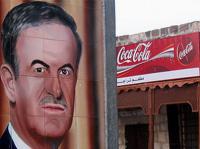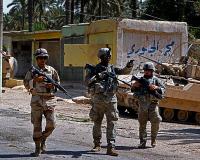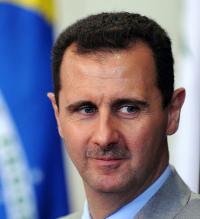-
Process of radicalization is becoming more complex: Experts

Officials and security experts have been to determine what could have led Syed Rizwan Farook and Tashfeen Malik to become radicalized and when, and over what period, the process of radicalization took place.“I think the face of radicalization has changed,” said one expert. “It’s a hybrid now — a hybrid, robust network to mobilize people to action to commit acts of violence under the banner of compelling narratives.”
-
-
Germany’s new anti-terror police unit, squeezing ISIS financially, U.S. Libyan operations
Germany on Wednesday announced the creation of a new police unit which officials said will be specifically armed, outfitted, and trained to deal with terrorism; the UN Security Council on Thursday passed a resolution aiming to make it more difficult for IIS to raise funds by selling oil and antiquities, ransom payments, and other criminal activities. It remains to be seen whether the two big buyers of ISIS oil – the Assad regime and Turkey – will comply; a Facebook photo inadvertently reveals U.S. commando presence in Libya.
-
-
“Death ray” plotter gets 8 years for plan to kill Muslims, Obama
Eric Feight, 55, has been sentenced to more than eight years in prison for plotting to build a remote-controlled radiation-emitting “death ray” with which he was planning to kill Muslims and assassinate President Barack Obama. He admitted to helping a Ku Klux Klan member Scott Crawford to modify an industrial-grade radiation device, dubbed a “death ray,” and building a switch to operate it from a distance.
-
-
Israel-Turkey rapprochement; refugees’ jewelry in Denmark; mysterious death in Argentina
Israel and Turkey were once close allies, but the relationship between the two countries has cooled after the Islamist party of President Recep Tayeep Erdogan came to power in 2002, and he was elected president in 2003. The two countries have decided that the many challenges they face in common now justify the resumption of normal relationship, even if the two countries are deeply divided over the treatment of the Palestinians by Israel; Denmark is set to pass a law which would allow authorities to confiscate jewelry from refugees entering Denmark in order to pay for some of the refugee-related expenditures by the government; the new government in Argentina will reopen the investigation in to the mysterious death in January of a prosecutor who was about to charge former president Cristina Fernandez de Kirchner with covering up Iran’s involvement in the killing of eighty-five Argentinian Jews in 1994.
-
-
New evidence released showing deaths in Syrian state detention centers

Human Rights Watch has released new evidence that up to 7,000 Syrians who died in state detention centers were tortured, mistreated, or executed. The human rights organization says that holding Syrian government officials to account should be central to peace efforts. Observers were aware of the five large detention centers the Assad regime ran. Analysts estimate that more than 117,000 Syrian civilians were tortured and mistreated in these centers since the anti-Assad rebellion erupted in March 2011.
-
-
Saudi-led alliance sends troops to Syria; protecting Mosul dam; Italy and refugees

On Monday, Saudi Arabia announced the formation of a new alliance, consisting of thirty-four Sunni Arab and Muslim states, to fight terrorism. The alliance forces will join the moderate rebels in Syria – Prime Minister David Cameron said last week that these rebels were 70,000-strong – not only to fight ISIS, but also to turn their fire on the weakening Assad regime’s military; Italy will send troops to defend the strategically important Mosul Dam in northern Iraq; the EC ordered Italy to use force if necessary to compel migrants and refugees to have their fingerprints taken, this obliging these refugees to apply for asylum in Italy rather than use Italy as a corridor on their way to other EU countries.
-
-
34 Muslim states form new military alliance to fight terrorism
Saudi Arabia has announced the formation of a 34-state Islamic military coalition to combat terrorism, according to a statement published by SPA, the state news agency. A long list of Arab countries such as Egypt, Qatar, and the UAE, along with Turkey, Malaysia, Pakistan, and several African states were named in the Saudi statement. Iran is not part of the new alliance.
-
-
U.S. officials barred from reviewing social media postings of visa applicants
Officials from DHS and the Department of State, as a general policy, do not check social media postings of applicants out of civil liberties concerns. With this policy in place, the department’s officials who handled Tashfeen Malik’s application could not have seen her pro-ISIS postings and note her growing radicalization. Officials from United States Citizenship and Immigration Services (USCIS) and U.S. Immigration and Customs Enforcement (ICE) pressed for a change in DHS policy in light of the fact that social media is increasingly used by followers of jihadist groups to declare their allegiance, but the disclosures by Edward Snowden about NSA surveillance programs was behind the reluctance of DHS high officials to change the policy for fears such a change would further damage the administration’s standing with civil rights groups and European allies.
-
-
The third intifada; new, smaller Schengen; EU border patrol
Mahmud Abbas, the president of the Palestinian Authority, has been warned by the military wing of the PLO that unless he can persuade the UN Security Council to vote for a resolution calling for the creation of an independent Palestinian state, a new intifada will be launched to convince Israel that a continued occupation of Palestinian lands will be costly; European officials are planning to abandon the 30-year old Schengen Agreement and replace it with a much smaller, Western Europe-only free-travel zone; facing rising seas, residents of the Pacific island of Tuvalu are looking for a new home.
-
-
How French strategies prevented Al Qaeda's expansion in Mali
There have been many books on the U.S. wars in Iraq and Afghanistan, but there are few about the recent military interventions of America’s allies in countries such as Mali and others on the African continent. Because the January 2013 French intervention in Mali against the local Al Qaeda affiliate was quick, effective, and relatively low cost, the story contains valuable lessons for future strategy.
-
-
French backlash, Egypt: no terrorism in plane crash, Libyan unity government

The French right-wing Front National failed to translate its gains in the first round of France’s regional elections a week ago into any victories in the election’s second round on Sunday; Angela Merkel, facing growing opposition from within her party to her open-door refugee policy, said she would limit number of refugees arriving in German; Turkish prime minister Erdogan says the Middle East “would benefit greatly from normalization of Turkish-Israeli relations; the two rival Libyan governments are set to sigh a historic peace accord in Morocco on Wednesday.
-
-
Flawed U.S. Senate report on CIA torture doomed to "eternal controversy": Researcher

The U.S. Senate summary report on the allegations of CIA torture during the “war on terror” failed to live up to its original purpose, a Stanford scholar said. The researchers says that the U.S. Senate’s 2014 summary report on alleged CIA torture and interrogation Four key errors have doomed the Senate report to “eternal controversy,” she said: “It was not bipartisan, took too long to write, made little effort to generate public support along the way, and produced a declassified version that constituted a tiny portion of the full study.”
-
-
Terror attacks in Paris and California expose modern society’s lack of resilience
Our complex global society lacks resilience. The root cause of our vulnerability is the structure of the global economy: highly interconnected, complex, and filled with turbulence. Major disasters can occur unexpectedly, and even minor incidents can cascade into significant human and financial losses. Emerging pressures such as climate change and urbanization will only intensify the potential for extreme events and severe disruptions. Risk management makes sense in a stable environment with predictable events, but in today’s more complex risk landscape — the new normal — it is inadequate for dealing with fast-moving, unfamiliar threats that may cascade into disasters. The good news is that brittleness is not inevitable. It is a fundamental design flaw. Resilience — the capacity to survive, adapt, and flourish in the face of disruptive change — is a basic characteristic of all living systems, from individual creatures to entire ecosystems. In this age of turbulence, resilience has become a prerequisite for continued prosperity.
-
-
FBI unable to break 109 encrypted messages Texas terror attack suspect sent ahead of attack

FBI director James Comey told lawmakers this week that one of the suspects in the foiled terror attack in Garland, Texas, in May had exchanged 109 messages with sources in a “terrorist location” overseas ahead of the attack. U.S. intelligence and law enforcement agencies, however, have not been able to break into and read those messages because they were exchanged on devices equipped with end-to-end encryption software which, security services in the United States and Europe argue, make it impossible to monitor and track terrorists and criminals.
-
-
Assad’s future; Israel’s missile defense; U.S. overseas bases

Israel’s chief-of staff said that the likelihood of the Assad-Hezbollah-Iran axis winning the war in Syria is “zero” (his words). The Alawite community is too small to continue and provide soldiers to Syria’s army; both Iran and Hezbollah appear to have concluded that the cost of maintaining Assad in power is just too high; and Russia has decided against sending ground troops. Israel has successfully tested the Arrow-3, its anti-ballistic system designed to intercept long-range missiles. The Pentagon proposes creating an architecture of hub-and-spokes military bases overseas to fight terrorists.
-
- All
- Regional
- Water
- Biometrics
- Borders/Immig
- Business
- Cybersecurity
- Detection
- Disasters
- Government
- Infrastructure
- International
- Public health
- Public Safety
- Communication interoperabillity
- Emergency services
- Emergency medical services
- Fire
- First response
- IEDs
- Law Enforcement
- Law Enforcement Technology
- Military technology
- Nonlethal weapons
- Nuclear weapons
- Personal protection equipment
- Police
- Notification /alert systems
- Situational awareness
- Weapons systems
- Sci-Tech
- Sector Reports
- Surveillance
- Transportation
Advertising & Marketing: advertise@newswirepubs.com
Editorial: editor@newswirepubs.com
General: info@newswirepubs.com
2010-2011 © News Wire Publications, LLC News Wire Publications, LLC
220 Old Country Road | Suite 200 | Mineola | New York | 11501
Permissions and Policies
Editorial: editor@newswirepubs.com
General: info@newswirepubs.com
2010-2011 © News Wire Publications, LLC News Wire Publications, LLC
220 Old Country Road | Suite 200 | Mineola | New York | 11501
Permissions and Policies
